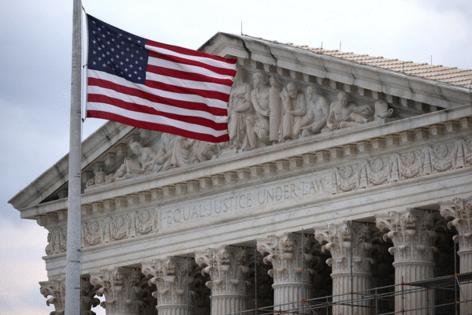Noah Feldman: Supreme Court should give Catholic Charities a tax exemption
Published in Op Eds
Should Catholic Charities be exempt from paying state unemployment taxes because it has a religious purpose?
The Supreme Court heard oral arguments on the issue Monday, and the odds look good that the court will grant the exemption. But the way it does so matters. A narrow ruling would protect the general principle that religious organizations can be subject to employment and non-discrimination laws when they do secular things. A broad ruling, in contrast, could give religious organizations carte blanche to ignore general laws, even when they are performing functions that are also performed by secular entities.
The case, Catholic Charities v. Wisconsin Labor & Industry Review Commission, grows out of a decision by the Wisconsin Supreme Court — the same court that’s been in the news because of the hotly contested, ideological election for its swing seat. At issue was a provision of state unemployment law, modeled on language from federal employment law, that grants an exemption to an organization “operated primarily for religious purposes.”
It’s settled law in Wisconsin and elsewhere that a church fits under this category and thus doesn’t have to pay unemployment taxes. If the Catholic Church owned Catholic Charities directly, it would be exempt from the taxes.
But Catholic Charities operates as a separately incorporated 501c3, not formally part of the church. The particular Catholic Charities arm in this case has the stated mission of “providing services to the poor and disadvantaged as an expression of the social ministry of the Catholic Church.” A Catholic bishop controls the operations and appoints all the board members.
Catholic Charities took the view that because of its design and because the objective of its activities is to fulfill a religious mission, it is “operated primarily for religious purposes” and should get an exemption under state law.
The Wisconsin court held that the relevant legal question was whether the charity’s activities were “primarily religious in nature.” It defined “religious activities” as “typical” forms of religious exercise, such as worship services, proselytization, and religious education, and it also considered whether the activities were open to people of other faiths. By these measures, the court held, Catholic Charities’ activities weren’t primarily religious because it provides all kinds of aid to all types of people in need and doesn’t handle worship, prayer and education, which are run by the Church directly.
All or nearly all the justices at oral arguments on Monday seemed to think the Wisconsin court’s opinion got the law wrong. I agree with them: it makes little sense to define religious purpose, which the law requires, regarding how religious some activities performed for a religious purpose may be.
What makes the case tricky is that the Wisconsin Supreme Court, not the US Supreme Court, is supposed to have the last word on what state law means, even if its view is wrong. So Catholic Charities couldn’t directly ask the Supreme Court to say the state court got the law wrong. Instead, it argued that the First Amendment mandates that it get the exemption.
Justice Neil Gorsuch, who likes bright-line rules, suggested that the law as read by Wisconsin would discriminate between a religion that doesn’t proselytize when it does charity (like Catholic Charities) and one that does. Justice Elena Kagan sounded like she was on board.
Deciding the case that way would grant the exemption while avoiding a controversial doctrine known as “church autonomy,” which Catholic Charities sought to invoke. The doctrine, if applied here, would carve out a broad exemption from general laws for any church-related entity.
In practice, a broad church-autonomy holding, in this case, would enable any group that calls itself religious to be exempt from state laws. That includes not only unemployment laws but, importantly, anti-discrimination laws. It could also include laws requiring any conduct a religious group says it dislikes or disapproves of. Catholic hospitals alone have more than 750,000 employees in the US.
No such doctrine was known to the Framers, nor can it be gleaned from First Amendment precedent, in my view. Pioneered by Notre Dame law professor Richard Garnett, a conservative scholar I admire and respect, the belief descends from the medieval Catholic teaching championing the “freedom of the church,” or libertas ecclesiae. In other words, it’s an aspirational Catholic governance ideal, not an argument derived from the Constitution that belongs in the Supreme Court.
It’s noteworthy that Justice Amy Coney Barrett, herself a former Notre Dame law professor and colleague of Garnett’s, suggested that church autonomy might not logically apply here, where the church has itself chosen to incorporate Catholic Charities separately and is not being coerced to do anything it doesn’t want to do.
A narrow anti-discrimination ruling could highlight that it makes little sense for Wisconsin to decide that what counts as “religious” is proselytizing or focusing on co-religionists. Many faiths seek to do good for the outsider, not just the insider-believer. There is no reason to favor one religious approach to charity over another. Indeed, in today’s polarized climate, the more we can be constitutionally fair to open-minded and open-handed approaches like that of Catholic Charities, the better.
____
This column does not necessarily reflect the opinion of the editorial board or Bloomberg LP and its owners.
Noah Feldman is a Bloomberg Opinion columnist. A professor of law at Harvard University, he is author, most recently, of “To Be a Jew Today: A New Guide to God, Israel, and the Jewish People."
©2025 Bloomberg L.P. Visit bloomberg.com/opinion. Distributed by Tribune Content Agency, LLC.




























































Comments